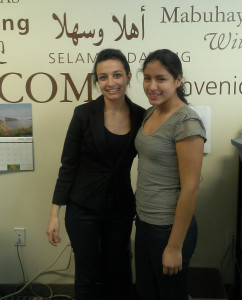Doris’ Story
One of Doris’ earliest memories of moving to the United States from Peru is a very ordinary one: doing laundry with her family. “It was strange at first,” she says, doing something so normal in such different surroundings. She, then 10 years old, and her younger brother had arrived in Astoria, Queens the day before. They moved in with her father, who had come to the U.S. five years earlier. Her mother had also been living in the U.S., but briefly returned to Peru to bring her children to New York.
At first, Doris didn’t think the move would be permanent. She wanted to go home: she missed her relatives in Peru, who had raised her and her brother while her parents were away, terribly. However, she soon came to feel that she was a part of the Astoria community: every year, she volunteers at her parish’s summer camp, where she works with kids and takes them on field trips around the city.
Doris, now 17, is a senior at a Catholic high school in Manhattan with dreams of becoming a pediatrician. Like many students in their final year of high school, much of Doris’ time has been devoted to her studies and applying to college. However, despite her good grades and work ethic, her undocumented status has been a barrier to realizing her full academic potential. In her junior year, for instance, her high school offered its students the opportunity to do an internship. With plans to go to medical school after college, Doris hoped to secure an internship at a local hospital. However, since the hospital required interns to have a Social Security Number, she was unable to participate in the program. Her immigration status has also affected her pursuit of a higher education. Doris was awarded a merit-based academic scholarship to college, but since undocumented students are ineligible for federal student aid, the college rescinded its offer.
When she first heard about Deferred Action for Childhood Arrivals (DACA)—a policy that grants renewable two-year deferrals on deportation proceedings and work permits to eligible undocumented youth—in the news, she was initially reluctant to add to her stress from school and college applications by applying. But ultimately, it was the ability to work legally and the possibility of educational opportunity that convinced Doris to apply for DACA.
Doris came to Catholic Migration’s DACA information and screening session at St. Joan of Arc in Jackson Heights last September. She and her family had consulted several other legal services providers, but all charged significantly higher fees than Catholic Migration. On her experiences with CMS, Doris says: “It was amazing.” Her immigration counselor, Megan, “was very helpful and nice.”
Doris’s DACA application was approved in December. With the Social Security Number she received from her work permit, Doris now plans to participate in her school’s internship program and gain experience working at a hospital. Ultimately, she hopes that immigration reform—currently being formulated into bills by Congress—will pave the way for her and other DACA youth to achieve permanent legal status in the United States. As a legal permanent resident, and eventually as a U.S. citizen, Doris would qualify for federal student aid, which would make college and medical school more affordable, and would also be able to visit her relatives in Peru, whom she has not seen in 7 years.

